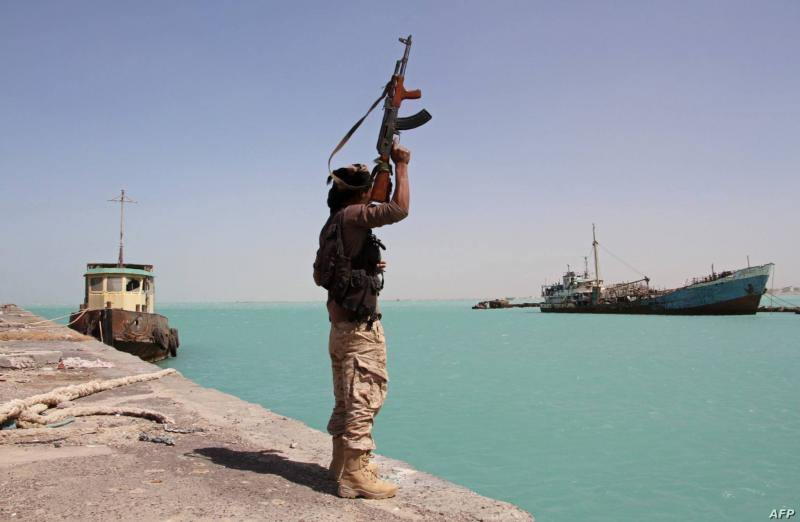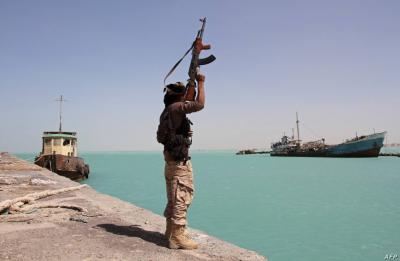Egypt is anticipating the repercussions of ongoing tensions in the Red Sea and their impact on navigation through the Suez Canal. While Cairo has confirmed the "regularity" of traffic through the canal, it also noted that it is monitoring the decisions of major shipping companies to reroute their vessels to the "Cape of Good Hope" due to security threats.
Cargo ships traveling from Europe to the Far East usually pass through the Red Sea via the Egyptian Suez Canal to avoid wasting time and incurring higher costs when taking the route around Africa via the "Cape of Good Hope". In an official statement on Sunday, the head of the Suez Canal Authority, Lieutenant General Osama Rabie, stated that the authority is "closely monitoring the ongoing tensions in the Red Sea and studying their impact on navigation through the canal, noting that some shipping lines have announced temporary rerouting of their ships to the Cape of Good Hope." However, he confirmed the "regularity" of navigational operations in the canal.
In recent weeks, ships passing through the Red Sea have been subjected to attacks and seizures by the "Houthi" group in Yemen in response to the Israeli war on the Gaza Strip. This has led major shipping companies such as "MSC," "Maersk," and "CMA CGM" to announce a "temporary halt to their routes through the Suez Canal". Rabie stated that "55 ships have indeed rerouted to pass through the Cape of Good Hope from November 19 to date," but he emphasized that "this is a small percentage compared to the 2,128 ships that transited through the Suez Canal in the same period."
While the Secretary-General of the Arab Ports Federation, Major General Essam El-Din Badawi, asserts that "the canal has not yet been affected by the security threats from the Houthi group," he warned about "the possibility of future impacts and disruptions to global trade should the crisis continue for an extended period."
Badawi told Al-Sharq Al-Awsat that "so far, navigation rates in the Suez Canal remain as they are, especially since several ships cross it twice, coming from Europe and unloading their cargo in Red Sea ports before returning again to Europe without heading south towards the Bab el-Mandeb Strait." He explained: "Large ships typically complete their journey from Europe to the Far East via the canal, but there are also ships targeting ports in Red Sea countries."
The Bab el-Mandeb Strait is one of the world's key routes for shipping raw goods by sea, particularly crude oil and fuel from the Gulf to the Mediterranean Sea via the Suez Canal or the nearby SUMED pipeline, in addition to goods headed east to Asia, including Russian oil.
On Sunday, 77 ships crossed the canal with a total cargo of 4 million tons, according to the head of the Suez Canal Authority, who noted that "some of these vessels belong to shipping lines that announced temporarily rerouting from the Suez Canal due to their presence in the Red Sea before announcing the reroute." Among the ships that transited on Sunday were the "MAERSK SAIGON," "CMA CGM CHRISTOPHE COLOMB," and "MSC FABIENNE," according to the official Suez Canal report.
However, Badawi expressed concern over the potential impact of Houthi security breaches on Suez Canal revenues, given the ongoing rerouting of major shipping companies. He clarified that "these companies previously generated significant revenues for the canal, as each ship carries around 120 containers, indicating substantial loads for a large number of vessels." He predicted that "if the situation continues, Suez Canal revenues will fall below last month's levels" but simultaneously expressed hope for a swift resolution to the crisis, linked to resolving the situation in Gaza.
The Suez Canal is one of Egypt's main sources of hard currency. Last November, the Suez Canal Authority announced a 20.3% increase in canal revenues, amounting to approximately $854.7 million year-on-year, up from $710.3 million in November 2022. For his part, Rabie emphasized that "the Suez Canal will remain the fastest and shortest route, as the savings rates for journeys between Asia and Europe via the canal range from 9 days to 2 weeks, depending on the departure and arrival ports." Security breaches in the Red Sea lead to increased insurance costs against risks for ships passing through; thus raising the expenses that shipping companies incur on their journeys from north to south via the canal.




